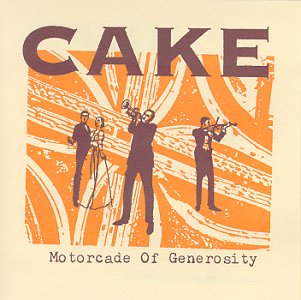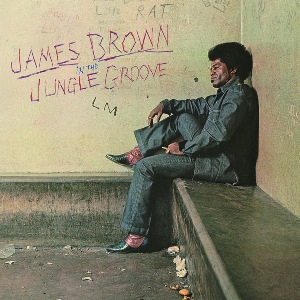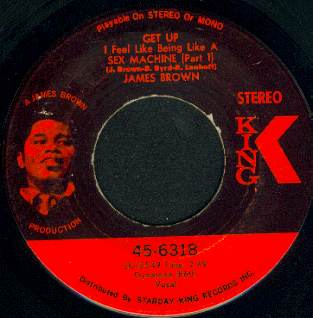Related Research Articles

Cake is an American rock band from Sacramento, California, consisting of singer John McCrea, trumpeter Vince DiFiore, guitarist Xan McCurdy, bassist Daniel McCallum, and drummer Todd Roper. The band has been noted for McCrea's sarcastic lyrics and deadpan vocals, and their wide-ranging musical influences, including norteño, country music, mariachi, disco, rock, funk, folk music, and hip hop.

My Generation is the debut studio album by English rock band the Who, released on 3 December 1965 by Brunswick Records in the United Kingdom, and Festival Records in Australia. In the United States, it was released on 25 April 1966 by Decca Records as The Who Sings My Generation, with a different cover and a slightly altered track listing. Besides the members of the Who, being Roger Daltrey (vocals), Pete Townshend (guitar), John Entwistle (bass) and Keith Moon (drums), the album features contributions by session musician Nicky Hopkins (piano).

Fashion Nugget is the second studio album by alternative rock band Cake. It was released in 1996, and contains 14 songs. "The Distance" and "I Will Survive" became the most successful singles on the record, with the prior peaking at number 22 in the UK and at number 4 on the US Alternative Airplay Chart. The album was recorded at Paradise Studios in Sacramento, California.

Motorcade of Generosity is the debut studio album by American alternative rock band Cake. It was recorded at the Pus Cavern studio in Sacramento, California, and released through Capricorn Records on February 7, 1994.

Sheik Yerbouti is a double album by American musician Frank Zappa, released in March 1979 as the first release on Zappa Records, distributed by Phonogram Inc. in the United States and Canada. The album was released in other countries by CBS Records. It is mostly made up of live material recorded in 1977 and 1978, with extensive overdubs added in the studio. In an October 1978 interview, Zappa gave the working album title as Martian Love Secrets. It was later released on a single CD.

Live at the Apollo is the first live album by James Brown and the Famous Flames, recorded at the Apollo Theater in Harlem in October 1962 and released in May 1963 by King Records. Capturing Brown's popular stage show for the first time on record, the album was a major commercial and critical success and cemented his status as a leading R&B star.

Star Time is a four-CD box set by American musician James Brown. Released in May 1991 by Polydor Records, its contents span most of the length of his career up to the time of its release, starting in 1956 with his first hit record, "Please, Please, Please", and ending with "Unity", his 1984 collaboration with Afrika Bambaataa. Writing in 2007, Robert Christgau described it as "the finest box set ever released... as essential a package as the biz has ever hawked, not just because it's James Brown, but because compilers Cliff White and Harry Weinger invested so much care and knowledge in it." Its title comes from the question Brown's announcer would ask concert audiences, as heard on the album Live at the Apollo: "Are you ready for star time?"

"Night Time Is the Right Time" or "The Right Time" is a rhythm and blues song recorded by American musician Nappy Brown in 1957. It draws on earlier blues songs and has inspired popular versions, including those by Ray Charles, Rufus and Carla, and James Brown, which reached the record charts. Creedence Clearwater Revival recorded a version of the song on their 1969 album, Green River. The Animals also included a version of the song on their debut album The Animals, released in 1964.

Mr. Smith is the sixth studio album by American hip hop recording artist LL Cool J, released on November 21, 1995, by Def Jam. The album has been certified Double Platinum in the US by the RIAA.

In the Jungle Groove is a compilation album by American funk musician James Brown, released in August 1986 by Polydor Records.
"Honky Tonk" is an instrumental written by Billy Butler, Bill Doggett, Clifford Scott, and Shep Shepherd. Doggett recorded it as a two-part single in 1956. It became Doggett's signature piece and a standard recorded by many other performers.

"Get Up Sex Machine" is a funk song recorded by James Brown with Bobby Byrd on backing vocals. Released as a two-part single in 1970, it was a no. 2 R&B hit and reached no. 15 on the Billboard Hot 100.

"Mother Popcorn (You Got to Have a Mother for Me)" is a song recorded by James Brown and released as a two-part single in 1969. A #1 R&B and #11 Pop hit, it was the highest-charting of a series of recordings inspired by the popular dance the Popcorn which Brown made that year, including "The Popcorn", "Lowdown Popcorn", and "Let a Man Come In and Do the Popcorn". The "mother" of the song's title was, in the words of biographer RJ Smith, "[Brown's] honorific for a big butt".
"Talkin' Loud and Sayin' Nothing" is a funk song written by James Brown and Bobby Byrd. Recorded in 1970 by Brown and the original J.B.'s with Byrd on backing vocals and updated with a new melody, it was twice released as a two-part single in 1972. It also appeared on the album There It Is.

Bodyheat is the 44th studio album by American musician James Brown. The album was released in December 1976, by Polydor Records. It includes the singles "Bodyheat" and "Kiss in '77". It was produced and arranged by James Brown. The cover and art work was by the Virginia Team.
"I Can't Stand Myself (When You Touch Me)", also known as "I Can't Stand It", is a song written and recorded by James Brown in 1967. It is the most successful of the handful of recordings he made with The Dapps, a band of white musicians led by Beau Dollar. The single release of the song, on which its transposure was pushed up a half step/key, rose to #4 on the Billboard R&B chart and #28 on the Pop chart. The single's B-side, "There Was a Time", also charted.
"It's Too Funky in Here" is a song recorded by James Brown. Released as a single in May 1979, it charted #15 R&B. It also appeared on the album The Original Disco Man. Critic Robert Christgau praised the song as the "disco disc of the year".
"Escape-ism" is a funk song by American musician James Brown. It was Brown's first release on his own label, People Records. It charted #6 R&B and #35 Pop as a two-part single in 1971. Both parts also appeared on the album Hot Pants in 1971, with the previously unreleased nineteen-minute unedited take of the track appearing on the album's 1992 CD re-release. According to Robert Christgau the song was "supposedly cut to kill time until Bobby Byrd arrived" at the studio.
"Kiss in 77" is a song written by Charles Sherrell and recorded by James Brown. Released as a single in 1977, it charted #35 R&B. It also appeared on the album Bodyheat. Robert Christgau gave the song a negative review, commenting sarcastically that it was "as 'brand new' as the 'New Sound!' [Brown] promises" on the jacket of its host album.

Take a Look at Those Cakes is a studio album by the American musician James Brown. It was released in December 1978 by Polydor Records. It was arranged by Brown and St. Clair Pinckney. The cover artwork was credited to Christoph Blumrich.
References
- ↑ "Take a Look at Those Cakes - James Brown". AllMusic. Retrieved April 6, 2016.
- ↑ White, Cliff (1991). "Discography". In Star Time (pp. 54–59) [CD booklet]. New York: PolyGram Records.
- ↑ "CG: Artist 1793". Robert Christgau. Retrieved 2016-10-13.